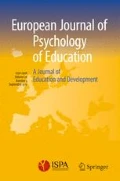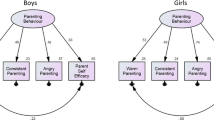Abstract
The present study examines the relationships between parental beliefs relating to development and education, parenting practices, and the intellectual and academic performances of children. Data were collected for 128 families with a child in the second or third year of primary school. Investigations of the factors affecting the children’s performances were carried out using two models that combined the different study variables. Compliance between the data and the theoretical models was tested by path analysis, using LISREL software. The results show a good fit between the data and the models and partly confirm the hypothesis that family educational practices are intermediary variables between parenting beliefs and a child’s intellectual and academic performances.
Résumé
Cet article présente une recherche qui a porté sur 128 familles et leur enfant scolarisé en C.E.1 et C.E.2 (deuxième et troisième année de l’enseignement primaire). L’étude a pour objectif d’examiner les relations entre les croyances parentales relatives au développement et à l’éducation, les pratiques éducatives familiales et les performances intellectuelles et scolaires de l’enfant. Deux modèles explicatifs des performances des enfants ont été construits mettant en relation les différentes variables de l’étude. La conformité des données aux modèles théoriques a été testée par des analyses en pistes causales effectuées à l’aide du logiciel LISREL. Les résultats montrent, d’une part l’adéquation des données aux modèles, et d’autre part, confirment partiellement l’hypothèse selon laquelle les pratiques éducatives familiales sont des variables intermédiaires entre les croyances parentales et les performances intellectuelles et scolaires de l’enfant.




Similar content being viewed by others
References
Adams, G. R., & Crane, P. (1980). An assessment of parents’ and teachers’ expectations of preschool children’s social preference for attractive or unattractive children and adults. Child Development, 51, 224–231.
Apostolidis, T., Duveen, G., & Kalampalikis, N. (2002). Représentations et croyances. Psychologie et Société, 5, 7–11.
Aunola, K., Nurmi, J. E., Lerkkanen, M. K., & Rasku-Puttonen, H. (2003). The roles of achievement-related behaviors and parental beliefs in children’s mathematical performance. Educational Psychology, 23, 403–421.
Baker, L., & Scher, D. (2002). Beginning readers’ motivation for reading in relation to parental beliefs and home reading experiences. Reading-Psychology, 23, 239–269.
Baumrind, D. (1991). Parenting styles and adolescent development. In R. Lerner, A. C. Peterson, & J. Brooks-Gunn (Eds.), The encyclopedia on adolescence (pp. 746–758). New York: Garland.
Becker, J. A., & Hall, M. S. (1989). Adult beliefs about pragmatic development. Journal of Applied Developmental Psychology, 10, 1–17.
Benedetto, P. (1969). Echelle Collective de Niveau Intellectuel. In INED & INETOP (Ed.), Enquête nationale sur le niveau intellectuel des enfants d’âge scolaire, tome 1 (pp. 33–50). Paris: PUF.
Bergonnier-Dupuy, G. (2005). Famille(s) et scolarisation. Revue Française de Pédagogie, 151, 5–16.
Campbell, F. A., Goldstein, S., Schaefer, E. S., & Ramey, G. T. (1991). Parental beliefs and values related to family risk, educational intervention, and child academic competence. Early Childhood Research Quarterly, 6, 167–182.
Chombart de Lauwe, M. J., & Feuerhahn, N. (1994). La représentation sociale dans le domaine de l’enfance. In D. Jodelet (Ed.), Les représentations sociales (pp. 320–340). Paris: PUF.
Constans, S., & De Léonardis, M. (2003). Co-construction of the representations of intelligence between mother and daughter: developmental and differential approaches. European Journal of Psychology of Education, 18, 369–387.
Emiliani, F., & Molinari, L. (1988). What everybody knows about children: Mother’s ideas on early childhood. European Journal of Psychology of Education, 3, 19–31.
Emiliani, F., & Molinari, L. (1994). From the child to one’s own child: Social dynamics and identities at work. European Journal of Social Psychology, 24, 303–316.
Goodnow, J. J. (1988). Parents’ ideas, actions and feelings: Models and methods for developmental and social psychology. Child Development, 59, 286–320.
Goodnow, J. J., & Collins, W. A. (1990). Development according to parents. London: Erlbaum.
Himelstein, S., Graham, S., & Weiner, B. (1991). An attributional analysis of matemal beliefs about the importance of child-rearing practices. Child Development, 62, 301–310.
Hirsjärvi, S., & Perälä-Littunen, S. (2001). Parental beliefs and their role in child-rearing. European Journal of Psychology of Education, 16, 87–116.
Hunt, J., & Paraskevopoulos, J. (1980). Children’s psychological development as a function of the inaccuracy of their mother’s knowledge of their abilities. Journal of Genetic Psychology, 136, 285–298.
Jöreskog, K., & Sörbom, D. (1998). LISEL 8. User’s reference guide. Chicago: Scientific Software International.
Knight, R. A., & Goodnow, J. J. (1988). Parents’ beliefs about influence over cognitive and social development. International Journal of Behavioral Development, 11, 517–527.
Lescarret, O., & Bertrand, D. (2002). Théories de l’enfant et de ses difficultés chez les parents français, vietnamiens et cambodgiens. L’autre, 3, 311–328.
Maccoby, E. E., & Martin, J. A. (1983). Socialisation in the context of the family: Parent-child interaction. In E. M. Hetherington (Ed.), Handbook of child psychology. Socialisation, personality, and social development (Vol. 4, pp. 1–102). New York: Wiley.
Machida, S., & Holloway, S. D. (1991). The relationship between divorced mothers’ perceived control over child rearing and children’s post-divorce development. Family Relations: Interdisciplinary Journal of Applied Family Studies, 40, 272–278.
Marcello, C. (1986). A study of implicit theories and beliefs about teaching in elementary school teachers. Paper presented at the symposium “Studies of teachers’thinking in action”, at the Annual Meeting of the American Educational Research Association, Washington, DC.
McGillicuddy-DeLisi, A. V. (1982). Parental beliefs about developmental processes. Human Development, 25, 192–200.
Miller, S. A. (1986). Parents’ beliefs about their children’s cognitive abilities. Developmental Psychology, 22, 276–284.
Miller, S. A., & Davis, T. L. (1992). Beliefs about children: A comparative study of mothers, teachers, peers and self. Child Development, 63, 1251–1265.
Molinari, F., & Emiliani, F. (1996). More on the structure of social representations: Central core and social dynamics. Social Representations, 5, 41–50.
Molinari, L., & Emiliani, F. (1999). Valeurs, responsabilité et identité sociale: Facteurs dynamiques dans les processus d’ancrage. Psychologie & Société, 2, 43–72.
Montandon, C. (1997). L’éducation du point de vue des enfants. Paris: L’Harmattan.
Mugny, G., & Carugati, F. (1985). L’intelligence au pluriel: les représentations sociales de l’intelligence et de son développement. Cousset: Delval.
Moscovici, S. (1998). The history and actuality of social representations. In U. Flick (Ed.), The psychology of the social (pp. 209–247). Cambridge: Cambridge University Press.
Nespor, J. (1987). The role of beliefs in the practice of teaching. Journal of Curriculum Studies, 19, 317–328.
Newberger, C. (1980). The cognitive structure of parenthood: Designing a descriptive measure. New Directions for Child Development, 7, 45–67.
Pajares, M. F. (1992). Teachers’ beliefs and educational research: Cleaning up a messy construct. Review of Educational Research, 62, 307–332.
Palacios, J. (1990). Parents’ ideas about the development and education of their children. Answers to some questions. International Journal of Behavioral Development, 13, 137–155.
Parsons Eccles, J., Adler, T. F., & Kaczala, C. M. (1982). Socialization of achievement attitudes and beliefs: Parental influences. Child Development, 53, 310–321.
Piaget, J. (1975). L’équilibre des structures cognitives, problème central du développement. Paris: PUF.
Pourtois, J. P. (1979). Comment les mères enseignent à leurs enfants de 5-6 ans. Paris: PUF.
Pourtois, J. P., & Desmet, H. (1989). L’éducation familiale. Revue Française de Pédagogie, 86, 69–101.
Pourtois, J. P., & Desmet, H. (2004). L’éducation implicite. Paris: PUF.
Reis, J. (1989). A comparison of young teenage, older teenage, and adult mothers on determinants of parenting. Journal of Psychology, 123, 141–151.
Russell, A. (1980). Matemal perceptions of the infant and beliefs about the rote of mother as mediators of childrearing behavior. Australian Journal of Early Childhood, 5, 19–23.
Russell, A., & Russell, G. (1982). Mother, father, and child beliefs about child development. Journal of Psychology, 110, 297–306.
Serbin, L. A., Steer, J., & Lyons, J. A. (1983). Mothers’ perceptions of the behavior and problem-solving skills of their developmentally delayed sons. American Journal of Mental Deficiency, 88, 86–90.
Sigel, I. E. (1985). A conceptual analysis of beliefs. In I. E. Sigel (Ed.), Parental belief systems: The psychological consequences for children (pp. 345–371). Hillsdale: Erlbaum.
Stoiber, K. C., & Houghton, T. G. (1993). The relationship of adolescent mothers’ expectations, knowledge, and beliefs to their young children’s coping behavior. Infant Mental Health Journal, 14, 61–79.
Tazouti, Y. (2003). Education familiale et performances scolaires des enfants de milieu populaire. Revue Européenne de Psychologie Appliquée, 53, 97–106.
Thompson, A. G. (1992). Teachers’ beliefs and conceptions: A synthesis of the research. In D. A. Grouws (Ed.), Handbook of research on mathematics teaching and leaming (pp. 127–146). New York: Macmillan.
Vandenplas-Holper, C. (1987). Les théories implicites du développement et de l’éducation. European Journal of Psychology of Education, 2, 17–39.
Wagner, D. A., & Spratt, J. E. (1988). Intergenerational literacy: Effects of parental literacy and attitudes on children’s reading achievement in Morocco. Human Development, 31, 359–369.
Acknowledgments
I would like to thank Nicole Fragas for his valuable collaboration and André Flieller for his comments on an earlier version of this article.
Author information
Authors and Affiliations
Corresponding author
Additional information
Youssef Tazouti. InterPsy (SITCOM), Nancy Universités, IUFM de Lorraine, 5, rue Paul Richard, C03-Maxéville, 54528 Laxou, France. E-mail: Tazouti@univ-nancy2.fr
Current themes of research:
Family education, intellectual performance, and academic achievement. Comparative education. Applied psychometrics.
Most relevant publications in the field of Psychology of Education:
Tazouti, Y. (2003). Etude des relations entre appartenance sociale, éducation familiale et performances scolaires: différentes stratégies de recherche. In A. Florin & P. Vrignaud (Eds.), Réussir à l’école: Les effets des dimensions conatives en éducation (pp. 101–116). Rennes: PUR.
Tazouti, Y. (2007). Environnement familial et développement cognitif. In M. Duru-Bellat & M. Fournier (Eds.), L’intelligence de l’enfant: L’empreinte du social (pp. 135–149). Paris: Editions Sciences Humaines.
Tazouti, Y., Viriot-Goeldel, C., Matter, C., Geiger-Jaillet, A., Carol, R., Deviterne, D. (2007). Étude comparative des effets des contextes préscolaires et familiaux français et allemand sur les compétences préalables aux apprentissages fondamentaux. Colloque international des IUFM du Pôle Nord Est, « les effets des pratiques enseignantes sur les apprentissages de élèves », 14 et 15 mars 2007, IUFM de Franche-Comté - Besançon.
Tazouti, Y., Flieller, A., Vrignaud, P. (2005). Comparaison des relations entre l’éducation parentale et les performances scolaires dans deux milieux socio-culturels contrastés (populaire et non populaire). Revue Française de Pédagogie, 151, 29–46.
Tazouti, Y. (2003). Education familiale et performances scolaires des enfants de milieu populaire. Revue Européenne de Psychologie Appliquée, 53, 97–106.
Rights and permissions
About this article
Cite this article
Tazouti, Y., Malarde, A. & Michea, A. Parental beliefs concerning development and education, family educational practices and children’s intellectual and academic performances. Eur J Psychol Educ 25, 19–35 (2010). https://doi.org/10.1007/s10212-009-0002-0
Received:
Revised:
Published:
Issue Date:
DOI: https://doi.org/10.1007/s10212-009-0002-0




